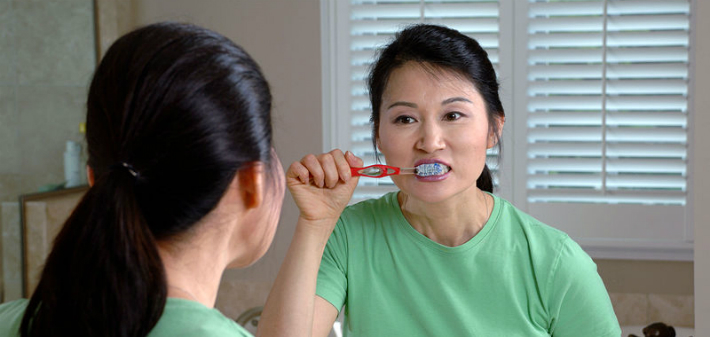If you experience pain from sensitive teeth, you may need more than a different toothpaste to treat your symptoms.
Despite their reputation for causing pain, dentists are committed to making their patients as comfortable and happy as possible. A sensitive teeth treatment, for example, may be painful in the short term, but it eliminates severe long-term pain and health risks. If hot, cold, or acidic foods cause you pain, ask your dentist about possible solutions to your teeth sensitivity.
What Are the Signs of Sensitive Teeth?
The most common symptom of sensitive teeth is pain, usually experienced in short, sharp bursts. This pain is the result of damage to your teeth’s protective enamel and cementum layers, which are necessary to protect your teeth’s interior structures from decay. If you have sensitive teeth, you are most likely to experience pain during the following activities:
- Consuming hot, cold, or acidic foods and drinks
- Flossing
- Brushing, especially with hard-bristle brushes
- Breathing through your mouth
Aside from making you aware that you have sensitive teeth, pain can also tell you the severity of the condition. Low levels of occasional pain indicate a minor case of sensitivity. Severe pain that persists for several days indicates more serious damage to your teeth, especially if you experience it in response to both hot and cold foods and drinks. The severity of the damage to your teeth will determine the type and urgency of treatment.
What Are My Options for Sensitive Teeth Treatment?
If you experience any degree of tooth sensitivity, consult your dentist immediately. For minor pain, they may recommend:
- Dietary Changes. If your dentist finds no evidence of serious tooth damage, they may suggest limiting how much you have ice cream, coffee, tomatoes, and other foods that cause pain.
- Desensitizing Toothpaste. Fortified with strontium chloride and potassium nitrate, this toothpaste blocks the pain receptors in your teeth. You have to brush with this toothpaste for several weeks before it kicks in, and your dentist may recommend that you rub it into your gums in addition to brushing with it.
- Modified Tooth Brushing. Hard-bristled toothbrushes damage teeth, so your dentist may recommend one with softer bristles and instruct you to brush more gently.
- Desensitizing Treatments. If at-home remedies do not relieve your pain, your dentist may coat your teeth with powerful desensitizing compounds during an office visit. This form of sensitive teeth treatment stabilizes your teeth’s nerves, reducing the potential for pain.
- Fluoride Gel. By coating your teeth with fluoride, your dentist can restore the damaged enamel, giving your teeth more protection.
If these treatments do not work, or if your dentist finds evidence of serious tooth damage, your dentist will try more extensive remedies like:
- Crowns and Other Implants. Sensitivity sometimes indicates decay, misalignment, or other flaws. Crowns, dental implants, and other restorative dental options can correct these problems.
- Gum Grafts. Excessive brushing creates wear and tear that can expose sections of your teeth beneath the gums. These parts of your teeth have fewer natural protections, but by grafting new tissue onto the gums, your dentist can inhibit the damage.
- Root Canals. The most serious cases of tooth sensitivity are the result of root damage, but a root canal procedure can eliminate the source of the problem.
Serious cases of tooth decay are often the result of treatable cases that are go unreported. If your teeth are even mildly sensitive, do not hesitate to speak to your dentist about them.
Arkansas Family Dental is a Little Rock dentist office with experience healing sensitive teeth, gum damage, and a wide range of other dental issues. Contact us to learn more about available sensitive teeth treatments at 501.663.8886.
Photo by Bill Branson for the National Cancer Institute


Leave a Reply